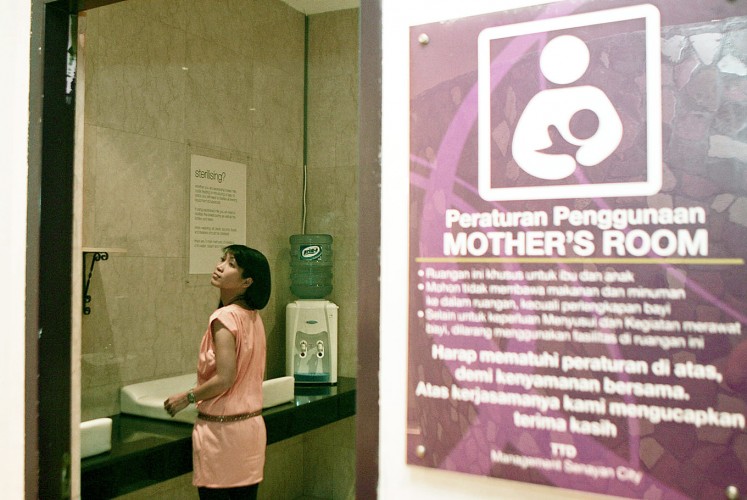Popular Reads
Top Results
Can't find what you're looking for?
View all search resultsPopular Reads
Top Results
Can't find what you're looking for?
View all search resultsSupporting breastfeeding mothers
Many people are still unaware that breastfeeding is the right of both mother and child.
Change text size
Gift Premium Articles
to Anyone
P
ractising breastfeeding soon after giving birth and for a period of two years or more as recommended by the World Health Organization (WHO) will not only boost infant health but also the well-being of breastfeeding mothers.
“Women who directly initiate breastfeeding will avoid various degenerative diseases like heart trouble and breast cancer,” Nia Umar, the deputy general chairperson of the Indonesian Breastfeeding Mothers Association (AIMI-ASI), told a recent discussion in Jakarta. For babies, breast milk, locally abbreviated as ASI, also promotes infant immunity and growth.
Mothers are entitled to the full support of different parties in order to be able to breastfeed their babies optimally. Law No 36/2009 regulates that during the breastfeeding period, families, local city administration and the society should support the mothers by providing them with time and facilities. However, many people still put the blame on mothers if they fail to nurse their babies instead of lending their support.
“In fact, post-natal mothers are vulnerable to stress, which will affect breast milk production,” said Farahdibha Tenrilemba, the secretary-general of AIMI-ASI.
Chandra Wijaya of the Mother and Child Health Movement revealed that Indonesia had signed an international agreement with the WHO to prioritize children’s breastfeeding until the age of 36 months. This is in conformity with the target of sustainable development goals (SDG) to enhance the health status of mothers, children and youths in Indonesia.
The agreement has spelled out various steps, including the elimination of certain formula milk advertisements. Ads claiming that formula milk products are good as substitutes for ASI are prohibited because they mislead breastfeeding mothers into thinking that formula milk has the same quality as breast milk.
Chandra added that the widely circulating ads on formula milk, even if they targeted children older than 3 years old, contained an implicit message.
For mom and babies: A woman stands in a nursing room of Senayan City shopping mall in Jakarta. Decent nursing rooms are available in some public spaces in the capital city, including in a number of upmarket shopping malls. (JP/R. Berto Wedhatama)“The message that will be tempting mothers is that they can still buy milk of the same brands meant for smaller children,” Chandra said.
Besides the nutritional consideration, breastfeeding will also help less prosperous families. “Good formula milk is mostly quite expensive and beyond the reach of low-income people,” said Chandra.
AIMI-ASI has also discovered that some families feed babies with less amount of the required formula, thus reducing their nutritional adequacy.
Apart from the media ads that remain in the gray area, the organization worries about disguised promotion launched by formula milk producers targeting breastfeeding mothers.
“They provide aid for midwives in the form of working equipment, education and training,” Chandra said, adding that although healthcare workers had no obligation to promote the products, they could be influenced by the aid.
Nia said midwives were actually at the forefront of the effort to campaign for the importance of breastfeeding among expectant and postnatal mothers. She said health workers, including midwives, were knowledgeable of the great benefits of breastfeeding, but they also have to reciprocate the training or clinic equipment provided by milk companies.
“Many midwives are apt to give up when facing a mother who has difficulty in her breastfeeding process and then recommend the use of formula milk,” she said.
The bill on formula milk advertisements that is not revised yet still allows the mass media promotion of certain types of formula milk. All this poses an impediment to the popularization of breast milk as the best nutrient intake for infants and early-age children.
AIMI-ASI hopes health workers could be free from any conflict of interest when it comes to serving breastfeeding mothers and infants.












